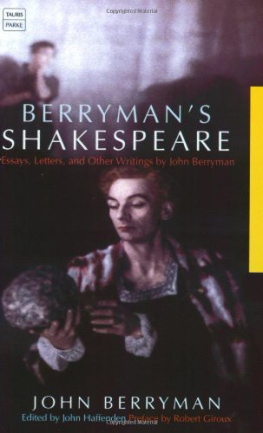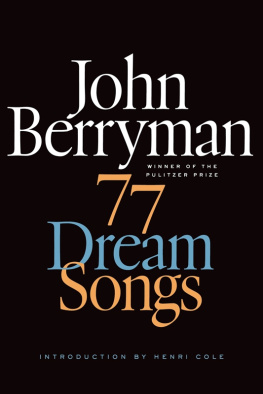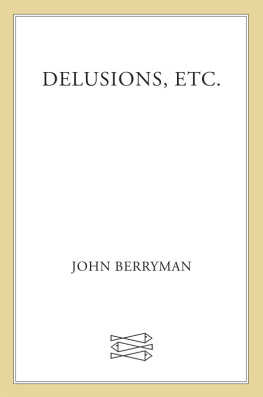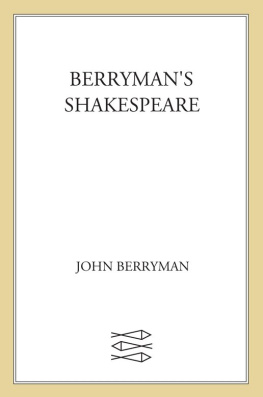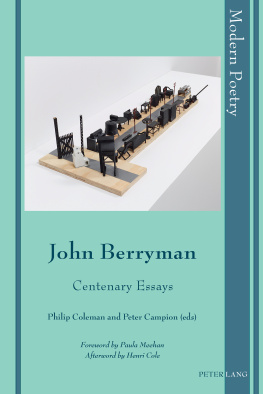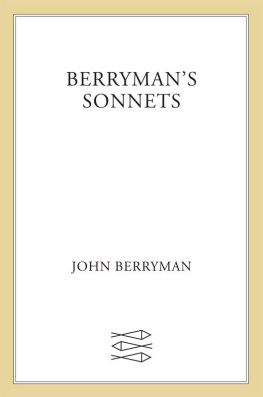John Berryman - 77 Dream Songs
Here you can read online John Berryman - 77 Dream Songs full text of the book (entire story) in english for free. Download pdf and epub, get meaning, cover and reviews about this ebook. publisher: Farrar, Straus and Giroux, genre: Detective and thriller. Description of the work, (preface) as well as reviews are available. Best literature library LitArk.com created for fans of good reading and offers a wide selection of genres:
Romance novel
Science fiction
Adventure
Detective
Science
History
Home and family
Prose
Art
Politics
Computer
Non-fiction
Religion
Business
Children
Humor
Choose a favorite category and find really read worthwhile books. Enjoy immersion in the world of imagination, feel the emotions of the characters or learn something new for yourself, make an fascinating discovery.

- Book:77 Dream Songs
- Author:
- Publisher:Farrar, Straus and Giroux
- Genre:
- Rating:5 / 5
- Favourites:Add to favourites
- Your mark:
- 100
- 1
- 2
- 3
- 4
- 5
77 Dream Songs: summary, description and annotation
We offer to read an annotation, description, summary or preface (depends on what the author of the book "77 Dream Songs" wrote himself). If you haven't found the necessary information about the book — write in the comments, we will try to find it.
77 Dream Songs — read online for free the complete book (whole text) full work
Below is the text of the book, divided by pages. System saving the place of the last page read, allows you to conveniently read the book "77 Dream Songs" online for free, without having to search again every time where you left off. Put a bookmark, and you can go to the page where you finished reading at any time.
Font size:
Interval:
Bookmark:
 The author and publisher have provided this e-book to you for your personal use only. You may not make this e-book publicly available in any way. Copyright infringement is against the law. If you believe the copy of this e-book you are reading infringes on the authors copyright, please notify the publisher at: us.macmillanusa.com/piracy. CONTENTS To Kate, and to Saul THOU DREWEST NEAR IN THE DAY GO IN, BRACK MAN, DE DAYS YO OWN. 3:63 BUT THERE IS ANOTHER METHOD . 3:63 BUT THERE IS ANOTHER METHOD .
The author and publisher have provided this e-book to you for your personal use only. You may not make this e-book publicly available in any way. Copyright infringement is against the law. If you believe the copy of this e-book you are reading infringes on the authors copyright, please notify the publisher at: us.macmillanusa.com/piracy. CONTENTS To Kate, and to Saul THOU DREWEST NEAR IN THE DAY GO IN, BRACK MAN, DE DAYS YO OWN. 3:63 BUT THERE IS ANOTHER METHOD . 3:63 BUT THERE IS ANOTHER METHOD .
Olive Schreiner DEEP IN THE MESS OF THINGS by Henri Cole There is no poet who sounds like John Berryman in his 77 Dream Songs . He is an underground poet who made up a new kind of poem. In 1965, when he was fifty, he received the Pulitzer Prize in Poetry for this daring sequence, and just seven years later, in Minneapolis, he jumped to his death from the Washington Avenue Bridge onto the ice of the Mississippi River. Berryman belonged to the new generation of poets emerging in the 1940s that included Robert Lowell, Sylvia Plath, Theodore Roethke, and Delmore Schwartz. Like his predecessors, he wrote skillful, intelligent poems, but he no longer felt adherent to T. S.
Eliots cult of impersonality. Instead, his poems dealt with experience often at the edge of disintegration and breakdown. In 77 Dream Songs , Berryman discovered a looser style that mixed high and low dictions with a strange syntax in a caudate sonnet of three six-line stanzas. His protagonist, Henry, stumbles along through life, a kind of antihero or front man, who, according to Berryman, both is and isnt him. We touch at certain points, he explained. But I am an actual human being; he [Henry] is nothing but a series of conceptionsmy conceptions.
Still, like Berryman, who suffered from alcoholism and depression, Henry is troubled, vulnerable, vehement, libidinousand he is a white American in early middle age living at some outer boundary where the soul is in crisis. You might say that the speaker of the Dream Songs, Henry, is a modern day Saint Augustinea writer of particular interest to Berrymanwho talks about himself in the first, second, and third person. Henry has a hard time. People dont like him, and he doesnt seem to like himself, Berryman said about Henry. Sometimes he doesnt even know his name: hes either Henry or hes Henry Pussy-cat or hes Henry House. Sometimes the poems are dialogues with an unnamed friend who calls him Mr.
Bones, though Berryman would put quotation marks around friend , because this is one of the most hostile friends who ever lived, who keeps questioning the author and speaking for him. John Berryman was born John Allyn Smith, Jr., in Oklahoma in 1914, and brought up a strict Roman Catholic in the small town of Anadarko. When he was still a boy, the family moved to Tampa, Florida, where in 1926 his father, John Allyn Smith, Sr., killed himself. In her sympathetic memoir Poets in Their Youth , Eileen Simpson, Berrymans first wife, writes, John had felt a compulsion to go in search of his fathers ghost, a search which, though he wasnt consciously aware of it, would lead him to a new poetic subject and The Dream Songs . In Dream Song #42, Henry asks his dead father to remember him: O journeyer, deaf in the mould, insane with violent travel & death: consider me in my cast, your first son. Soon after being widowed, the poets mother married a banker named John Berryman, and her son took his surname before attending boarding school in Connecticut.
Later, at Columbia University, he studied with the literary scholar Mark Van Doren, who is credited with sparking Berrymans serious interest in writing poetry. Berrymans classmate Robert Giroux was a quiet, passionate literary man who would eventually become his editor at Farrar, Straus and Giroux; while they were still students in the 1930s, Giroux published Berrymans first poems in the college literary magazine. In an interview for The Paris Review , Giroux says that Berrymans mother caused her son to have difficulties greater than his illness. He calls her a campus mother who haunted him daily, from his undergraduate days at John Jay Hall to his wintertime suicide in Minneapolis in 1972. She was so theatrical that when she phoned Giroux with the news of her sons death, instead of reporting straightaway that hed killed himself, she said, Bob, John has gone in under the water. [The Ball Poem] Berrymans mother (who had changed her name from Martha to Jill at the request of her new husband) believed her son had slipped from the Minneapolis bridge and that it wasnt a suicide. [The Ball Poem] Berrymans mother (who had changed her name from Martha to Jill at the request of her new husband) believed her son had slipped from the Minneapolis bridge and that it wasnt a suicide.
Forty-four years earlier, she hadnt believed her husbands death was a suicide either, though hed shot himself in the chest outside their sons bedroom window. She told her son that shed removed all the bullets from the gun, which shed kept around only to frighten any thieves or rascals away. All his life, Berryman felt guilt-ridden about his fathers death at the age of thirty-nine, and his poems often revisit the violent facts. In his own interview for The Paris Review , Berryman explains that the Dream Songs are not confessional poems. He understands the confessional to be a place where you go and talk with a priest, and he hasnt been to confession since he was twelve years old. He sees himself as an epic poet and the collected Dream Songs are a long poemwith the greatest American poem, Walt Whitmans Song of Myself, as his model.
It too has a hero, a personality, and a self, but Berryman doesnt think his poem goes as far as Whitmans. He calls Song of Myself a wisdom work about the meaning of life and how to conduct it, but according to him, The Dream Songs does not propose a new system; that is not the point. If in poetry the first person pronounthe Iis not the poet, it is even less so in a Berryman Dream Song, where the speaker modulates immediately into Henry. And when it comes to Henrys religious and political opinions, they might not even be Henrys, since the poems are a transcript of his tragicomic nightmares. And since there is no structured plot to 77 Dream Songs , it coheres as a work about the personality of Henry rather than as a continuous narrative. According to Berryman, all the way through his poetry there is a tendency to regard the individual soul under stress.
The soul is not oneself, for the personal I, one with a social security number and a bank account, never gets into the poems; they are all about a third person. Im a follower of Pascal in the sense that I dont know what the issue is, or how it is to be resolvedthe issue of our common human life, yours, mine, your ladys, everybodys; but I do think that one way in which we can approach it, by the means of art, coming out of Homer and Virgil and down through Yeats and Eliot, is by investigating the individual human soul, or human mind. Berryman believed that writing poems was a vocation that demanded the attention of his whole being. His friend Saul Bellow said that he drew his writing out of his vital organs, out of his very skin. He spent thirteen years writing the Dream Songs and in them rejects the decorous Anglophilia and formal versification that were fashionable during the previous decade. I set up The Dream Songs as hostile to every visible tendency in both American and English poetry, Berryman said.
Instead, we get a new kind of dictionridiculous, grotesque, horrible, deliciousthat better suits the generally extravagant situations in which the sobbing protagonist Henry finds himself. At a public reading, Robert Lowell described Berrymans poems as being of a sort that people didnt expect to see again. They are obscure, and they revive obscurity at a time when people thought it was finished (though this assessment ignores a countertradition in American poetry that includes Black Mountain, the New York School, and the San Francisco Renaissance poets). A lot of the best poetry of the century is extremely difficult, Lowell tells his audience, and he doesnt mean such poems as The Waste Land, which originally seemed difficult and is now simpler than Longfellow almost. According to him, there are certain poems that remain difficultlike the Atlantis section of Hart Cranes The Bridge and great. After the Modern poetsStevens, Eliot, Ransom, Moore, Crane, Pound, and Frostsuddenly poetry was clear again, Lowell says.
Next pageFont size:
Interval:
Bookmark:
Similar books «77 Dream Songs»
Look at similar books to 77 Dream Songs. We have selected literature similar in name and meaning in the hope of providing readers with more options to find new, interesting, not yet read works.
Discussion, reviews of the book 77 Dream Songs and just readers' own opinions. Leave your comments, write what you think about the work, its meaning or the main characters. Specify what exactly you liked and what you didn't like, and why you think so.

